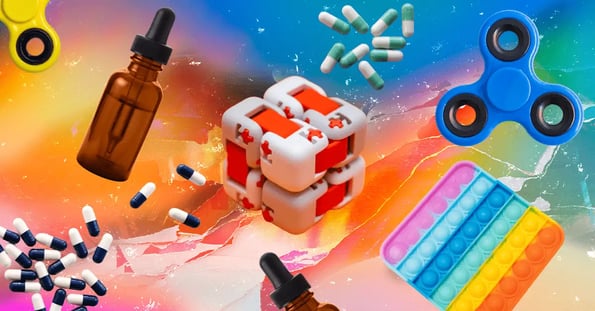Is your desk littered with discarded fidget spinners, coloring books, and maybe even some slime?

If so, you’re probably an American consumer — and you’re not alone.
With anxiety disorders affecting 40m US adults (19% of the population), and young people even more likely to experience mental health symptoms, alleviating stress means big business for brands.
And companies aren’t shying away from the challenge:
- Wearables like Apollo Neuro ($349), Muse (~$294), and Sensate ($299) promise to track and reduce stress.
- Coloring books, weighted blankets, and fidget toys of all kinds are sold as much-needed distractions.
- Supplements made with ingredients like ashwagandha, melatonin, and CBD are peddled on social media as sleep aids and anxiety cures.
While there’s no shortage of products guaranteeing to keep us calm, the anxiety industry has little regulatory oversight and the FDA doesn’t approve supplements.
Then why do these things sell?
Because consumers will try just about anything to relieve their mounting stress. And, importantly, because it’s not easy to get help.
A shortage of mental health workers and inferior insurance coverage means waitlists and costs are piling up, making mental health services out of reach for many.
Though telehealth businesses are trying to fill the void:
- The app Headspace has a range of content for managing anxiety, and its corporate offering, Ginger, brings the service to employees at enrolled companies.
- Platforms like BetterHelp, Talkspace, and Lyra connect users with mental health services online.
Plus, if talk therapy doesn’t work: There’s lots of VC funding and research flowing into the startups looking to treat mental health disorders with psychedelics.
bc75.jpg)